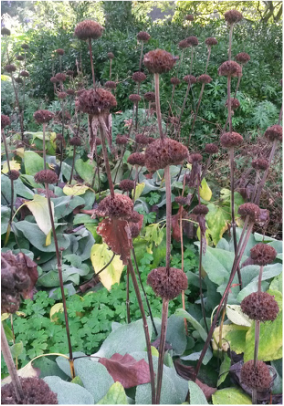
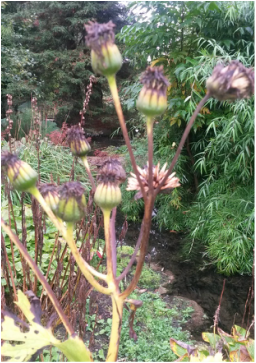
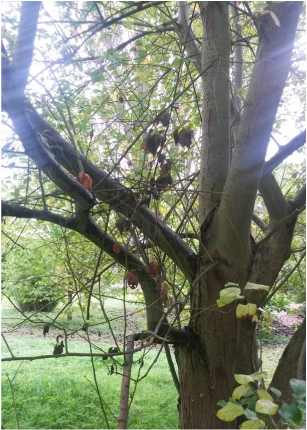
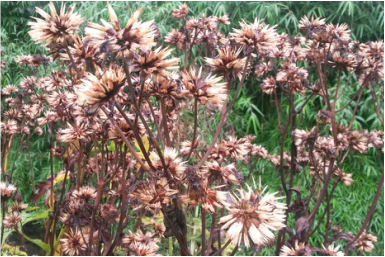
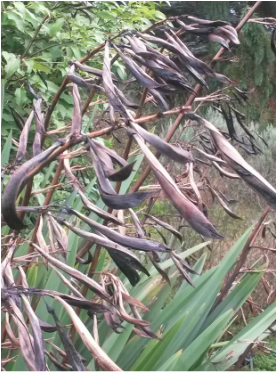
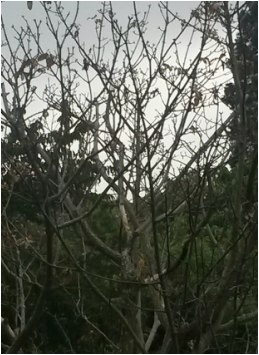
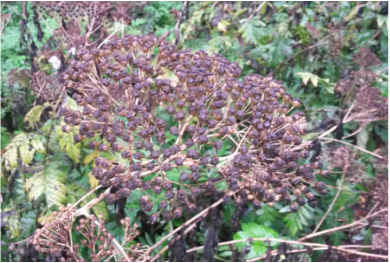
The quotation about language in the last paragraph is taken from Jason Cowley's 'Editor's Letter', the introduction to The New Nature Writing (Granta 2008)
|
|
 The words of the auctioneer’s warning have dogged my footsteps in recent weeks, and not just with the sense of the season’s winding up for this year. I’ve never been to an auction, apart from the annual post-harvest festival sale of produce in the village church in Cumbria, a good-natured if amateurish affair where local farmers vied with parish wives to take home gifts which they’d contributed in the first place. Willingham Auctions is a beast of a different nature as I discovered when my mum’s furniture went under the hammer a couple of weekends ago. Not in person: but I discovered that, via the internet, you can follow an auction pretty much anywhere in the world – no cameras, but with a live feed of bids and sales, a bit like tuning in to a live match commentary, but with an option to switch on the sound from the saleroom, so that you hear the fate of each item. I only intended to catch our first ‘lot’ – it didn’t take long to learn the lingo – but found it a riveting process which kept me glued to the computer for much of the day. Fortunately perhaps, Mum was unaware that this was going on; so for us this shedding of a lifetime’s accumulation of worldly goods had an added poignancy. For years she was a keen collector of antiques, silverware, fine china, believing that it enriched our lives and would be something of value for us to inherit. In the end, despite the sensitive handling of all at Willingham, it became just so much stuff to dispose of.  The process of getting rid of the old is of course reflected everywhere you look in the natural world just now. I’m not sure if it’s a rationalisation of my own ageing or simply a tendency to the maudlin, but there is something endlessly fascinating, I feel, in things when they are past their ‘best’. I like the sense of stripping down to the essentials: rather than being dazzled by colour or distracted by scent, you are left with the thing itself. I find myself stopping at every second step as I wander through the garden, marvelling at the form and texture of branch and twig, snapping away at bare stems and browning seedheads and dead stuff. I recall in the early days of the residency being enchanted with the way the phrase ‘gone over’ has slid into botanical terminology. Now, when a plant has ‘gone over’, I see a chance to appreciate the shape of the thing or, even more captivating, the architecture of the whole. Whilst I appreciate the artifice of garden design, though, it is the sense of what nature can do for itself which is the real magic for me. Hence, I suppose, my affection for prairie plantings and wild gardens, for the valerian still going strong in the wall at the bottom of my street rather than the most perfectly cultivated exotic.  The sense of an ending was echoed for me in the Matisse exhibition, the cut-outs a way for the artist to combine art and gardens in his final years. It’s also on my mind as I ration myself to a few pages a day of Dear Friend and Gardener, anxious not to reach the year’s end before the correspondents, Beth Chatto and Christopher Lloyd. Determined to visit Lloyd’s garden in Northiam before it closes for the winter, I book a couple of nights in a B&B in Rye, a bus ride away. And it’s not just Great Dixter that beckons: I’ve worked out that I can also travel by bus from Rye to New Romney and from there, on the Romney Hythe and Dymchurch Railway, remembered from childhood, to Dungeness. It’s almost four years since I first saw Derek Jarman’s garden at Prospect House, mid-way through what proved to be Mum’s last ‘Music at Leisure’ event at the Imperial Hotel in Hythe. A rather dismal weekend, I remember, the skies as grey as the concrete sea defences and the sea itself, so that the deep brown walls and yellow paintwork of the cottage, and the more muted tones of garden and shingle banks took on a technicolour brilliance. Since then, and now 20 years since his death, Jarman has accompanied my own faltering steps into the world of gardens, a repeated reminder to be bold and outward-looking, and to keep to the discipline of writing – even at his most poorly, Jarman wrote in his journal almost every day. After all, as Ali Smith says, it is the writing which sustains us; and love, of course.  What’s left of us, according to Christopher Woodward, Director of the Garden Museum is not, as Larkin would have it, only ‘love’ but also dust (‘just under 3 kilogrammes if you are cremated’, he says) and ‘the paper and electronic trail of an archive’. The Garden Museum’s project to set up the country’s first archive of garden design is in some ways a paradox in itself: ‘no one wishes the tangling, hopeful thing that is a garden to be frozen for ever in the unchanging light of a vitrine’, Woodward says. Still, the projected future of the Museum is a far cry from this Sleeping Beauty effect: restoration and refurbishment of the lovely little church of St-Mary-at-Lambeth creating five new galleries, a building extension comprising two new education pavilions and a café, and an archive study room with a three-storey tower housing over 100,000 items, a ‘collective memory of British gardens’, in particular the making of the modern garden. Digital access means that the museum’s treasures will have an unlimited audience. It’s a massively ambitious project and fund-raising is currently underway to match the Heritage Lottery Fund’s £3 million grant. Love and dust aside, Woodward himself raised almost £40,000 last month in an 8-day 125 mile swim of the Thames from Oxford to London, designed to highlight the museum’s intention to reclaim John Tradescant’s Ark, a plant hunter’s ‘cabinet of curiosities’, from the Ashmolean Museum.  Going but thankfully not gone, then. Which is more than can be said for the world’s wild life, 50 % of which has been lost in the last 40 years according to the World Wildlife Fund, as habitats are destroyed and ‘unsustainable numbers’ of animals are killed for food. Knowing that this loss is driven by human consumption, this is clearly a ‘call to arms’ says Mike Barratt, director of science and policy at WWF. A loss felt more keenly perhaps, or at least more immediately by the country’s poorest, is the £3 billion a year which will disappear from Britain’s budget if a Tory government is re-elected, under chancellor George Osborne’s proposed two-year freeze on benefits and tax credits. The fight against what seems unacceptable, globally or nationally, has increasingly become the province of the petition rather than the streets (although what about recent climate change marches – and Hong Kong demonstrations? Perhaps a change is in the air.) Some of the footage of protestors taking to the streets in the film ‘Pride’ which I saw recently recalled for me the emotional impact of being part of a mass protest, not at all the same feeling involved in signing an on-line petition. In a way it felt like watching the sad passing of the whole Labour movement, as well as a grim reminder of those early days of AIDS and the prejudices and ignorance with which it was greeted. Some things have definitely gone for the better.  And what has this to do with gardens? Of course the past is essential: the brown seed-heads I’ve been enjoying in the last few days rely on their past to secure our future. Even so, the ‘gardener’s natural – and healthy – tendency is to look forward’: Christopher Woodward again. Whilst there are things worth fighting for, and fighting against, there are also aspects of the past that we have to let go if we are not to become stifled by what Christopher Lloyd called ‘the dead hand of tradition’. A garden may still be, as Francis Bacon put it 400 years ago, the ‘purest of human pleasures’, affording an escape or at least a space for contemplation, and for many of us this is an essential aspect of our health and well-being. ‘Hearts starve as well as bodies,’ the old anthem goes. ‘Give us bread but give us roses.’ Jenny Uglow puts it neatly: ‘We may think we are tending our garden, but of course, in many different ways, it is the garden and the plants that are nurturing us.'  Increasingly, though, the garden seems to have its roots in the impurities of ordinary life. Whether you’re a guerrilla gardener, engaged in the war against neglect and scarcity of public space to grow things, or an individual committed to peat-free soils or drought-tolerant plants which need little watering, gardening is increasingly a political act. Ostrich time is definitely on the way out. And in the same way that gardening demands a new attitude, perhaps writing about gardens similarly demands a new language or form, something ‘urgent, vital and alert to the defining particulars of our times’. Definitely a timely reminder that, as far as the residency goes, my time is running out. Jenny Uglow wrote A Little History of British Gardening (Chatto & Windus 2005)
The quotation about language in the last paragraph is taken from Jason Cowley's 'Editor's Letter', the introduction to The New Nature Writing (Granta 2008)
0 Comments
Leave a Reply. |
At HomeAs Writer in Residence, thoughts from the garden Archives
October 2020
Categories |